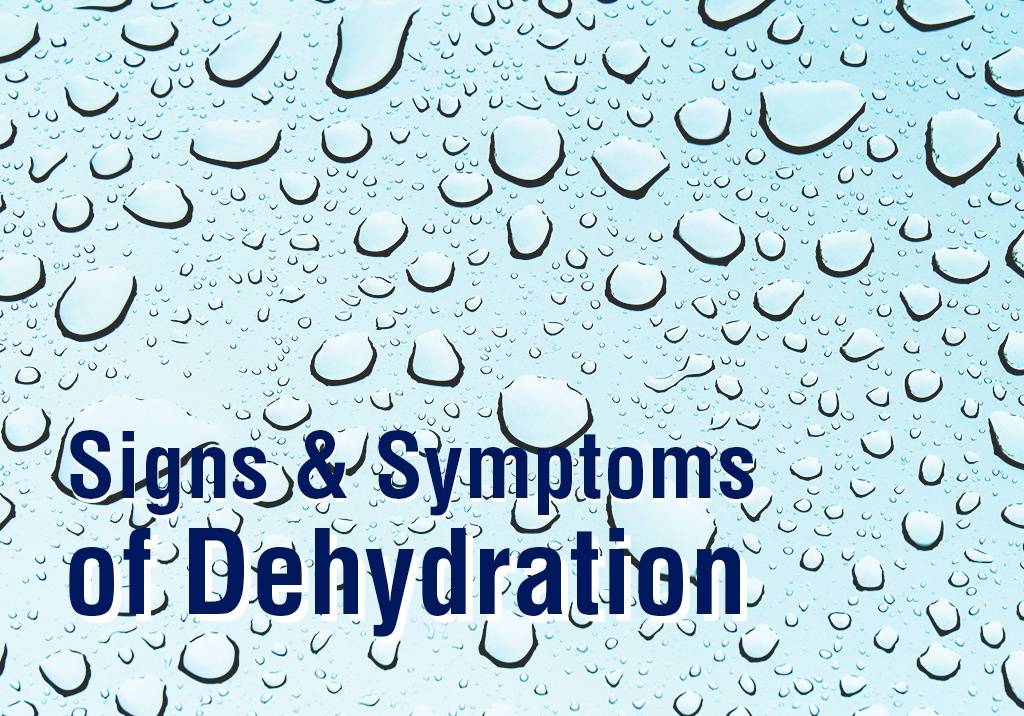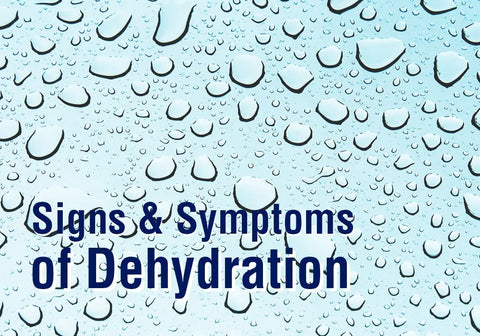
We all know how it feels on a hot day, when we intuitively know we need to drink more water. We find ourselves sweating on our way to work and reaching for an extra glass or two when we get to our desks. But do you know how to recognize the signs and symptoms of chronic dehydration?
Maybe you have a hunch that something is off with your health. Or you have some unexplained symptoms that don’t seem to be tied to any single cause. If so, there is a good chance you are suffering from chronic dehydration.

Have a headache? Before you pop a pill, try drinking some water.
Whether it’s because of our busy schedules or just not having enough water on hand, most of us – about 75 percent – suffer from chronic dehydration.
If you’re thinking, “I drink some water during the day, so I am probably okay,” there are some surprising causes of chronic dehydration, aside from just not drinking enough water, including:
Diarrhea: Diarrhea is the #1 cause of dehydration (and deaths associated with it). Typically, our large intestine absorbs water from food. But when we have diarrhea, the opposite happens: the body expels water, and can’t absorb it.
Stress: Our stress hormones and fight or flight response cause the body to get rid of fluids.
Sweating:Our body’s cooling mechanism works well to protect us from overheating, but can drain us of our fluids. Whether it’s due to a vigorous workout, hot temperatures, or a meeting that increased your anxiety levels, sweat increases fluid loss.
Diabetes:If you have diabetes, you are especially prone to dehydration. High blood sugar levels cause increased urination and fluid loss. One of the earliest symptoms of diabetes, “cotton mouth,” or dry mouth, often accompanies excessive thirst. If not treated, dehydration leads to even higher sugar levels
Living in a higher altitude: Since humidity is lower at high altitudes, sweat evaporates quickly, making it difficult to know how much water you are losing.
Other possible causes include burns, vomiting, and a diet that relies heavily on processed foods.
Quick tip: Learn how to treat dehydration and improve your daily hydration routines in our free guide on rehydration.
Get the guide: How to Rehydrate
Trouble focusing? Depressed? Tired? You could be chronically dehydrated.
As our bodies gets used to chronic dehydration, we lose our sensitivity to water deprivation, making it hard to tell that we need to drink more water.
So how can you tell if you are chronically dehydrated? Here are some certain signs and symptoms of chronic dehydration:
Ongoing digestive problems:Hydration is essential for virtually every bodily function. When it comes to digestion, even slight dehydration can have a big detrimental impact. If you suffer from frequent constipation, irritable bowel syndrome or acid reflux, chances are drinking more water could greatly improve your digestive health.
Fogginess, headaches, depression and lack of focus:Our brains rely heavily on our blood supply to function. When our blood supply is reduced due to dehydration, our brains can’t function properly. This often manifests in headaches and mental and emotional imbalances.
Muscle weakness:Dehydration causes problems with the balance of salts and electrolytes in our body. When dehydration is perpetual or severe, it can cause muscle weakness and fatigue.
Trouble losing weight:When your body doesn’t have enough water, your metabolism slows down. This, coupled with the fact that dehydration makes it hard for our bodies to utilize fat as fuel, and it’s easy to see how being hydrated could be preventing you from reaching your weight loss goals. Additionally, we often mistakenly recognize thirst as hunger, making it easy to pack in calories when what we really need is to hydrate.
Dry skin:If you find it hard to moisturize your skin, even when you are using heavy moisturizers, you likely need to start hydrating it more from the inside out.
Just as flowers perk up with a bit of water, so too does your body.
Fortunately, there is a simple solution to chronic dehydration: drink more water! Just be wary of where it comes from.
In order to stay hydrated, most of us need at least 64 ounces, of pure, clean water a day. Studies show that the source of our water is just as important, if not more, than how much water we drink.
So what are the best water sources? Here are a few essential hydration hacks to help get you started:
Research shows that tap water is safer than bottled water. It requires more regulations and has fewer chemicals and contaminates. Plus, the longer the bottled water sits, the more chemicals leak into the water itself. Yuck! Drinking tap water will make it easier for you to reach your daily water intake goal, too, since it is accessible pretty much anywhere.
Although many countries have banned BPA (or bisphenol-A) and declared it as toxic, the U.S. still allows it in cans and plastic bottles. Make sure you and your family are drinking water from 100% stainless steel bottles that are BPA-free.
Although pure, clean water is the best source of hydration (as opposed to tea and juices that contain caffeine and sugar), there is no reason not to have a little bit of fun with your water. It will make it easier to get all 64 ounces in a day, and you will find yourself looking forward to your next hydration break. Try adding lemon to your water, or tossing in some of these extras.
Now that you've read through these hacks, be sure to test yourself. Do you know how to recognize the signs and symptoms of chronic dehydration?